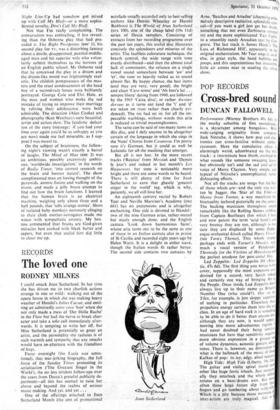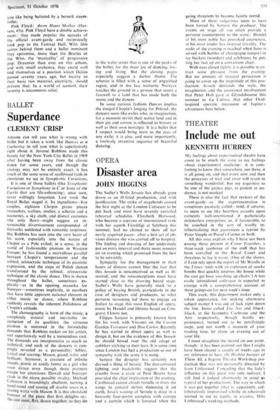POP RECORDS
Cross-bred sound
DUNCAN FALLOWELL
Performance (Warner Brothers 40s 8c1), in the murky suburbia of film soundtracks, is a skyscraper among bungalows. With wide-ranging originality from composer Jack Nitzsche, it shows how pop and elec- tronics can cross-fertilise without embar- rassment. Here the cumulative effect is alarmingly weird, adumbrated on the title track: a two-minute bass throb, overlaid by what sounds like someone sweeping leaves but obviously isn't and the sad soul ad lib voice of Merry Clayton. Very simple, and typical of Nitzsche's uncomplicated, rather dislocating effects.
Not all the tracks are songs but the best of those which are—and the only one writ- ten by Jagger, the 'Star of the Film'—is Memo from Turner, a wry manifesto for bisexuality (echoed pictorially on the cover). The backing musicians throughout sound remarkably like the Rolling Stones cribbing from Captain Beefheart (for which I here and now patent the term 'acid honk') and very bouncy they are too, although in one case they are displaced by some Zappa- esque orchestral kitsch called Harry Fbnien (see Tara's Theme). This whole strange package ends with Turner's Murder, very much a vocal version of Penderecia's Threnody for the Victims of Hiroshima and the perfect anodyne for post-coital bliss. Led Zeppelin: Led Zeppelin Ill (Atlan- tic, 47s 6d). The first thing you notice is the cover, supposedly the most expensive ever devised for a record, very lavish indeed and certainly one way of bringing Art to. the People. Once inside Led Zeppelin dont always live up to their name as Britain's Number One (who could?). Out on the Tiles, for example, is just sloppy repetition of nothing in particular. Elsewhere their propulsive energy-carries them into the as class. In an age of hard rock it is something to be able to do it better than anyone elst although they are now, it would meat- moving into more adventurous regions: i had never doubted their being sensitise musicians but here that sensitivity acquires more obvious expression in a greater We of volume dynamics, acoustic guitars. i so tones. There is, however, no diminution n what is the hallmark of the music of these Kafkas of pop: its icy, edgy, aloof neurosis High Tide: High Tide (Liberty, 39s ild The guitar and violin spiral round cicil other like huge ferris wheels. Just occas,10 ally they interlock and the whole cd163 rotates on a bass/drums axis. But nlore, often these large forces slip from then fingers and go lumbering about willy-111111; Which is a pity because those moments I inter-action are truly magical, that s
you like being battered by a berserk steam- roller.
Pink Floyd: Atom Heart Mother (Har- vest, 45s). Pink Floyd have a double achieve- ment: they made popular the squeaks of the official avant-garde and reciprocally took pop to the Festival Hall. With film scores behind them and a ballet imminent they epitomise, more than the Beatles or the Who, the 'musicality' of progressive pop. Dreamier than ever on this album, and with small orchestra, they could well find themselves at a position which Delius passed seventy years ago, but loyalty to their basic raw material, electricity, should prevent that. In a world of turmoil, their serenity is uncommon relief,











































 Previous page
Previous page